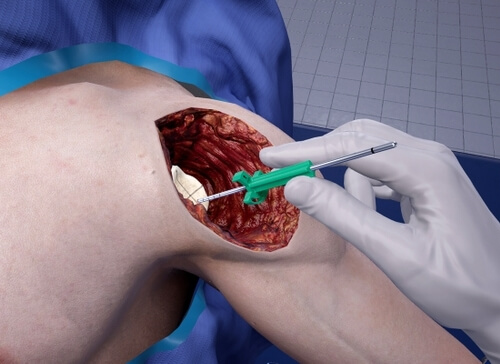 April 09, 2019 – Vancouver-based Precision OS has partnered with 10 North American universities and medical institutions to bring their virtual reality orthopedic surgery training platform into the surgical classroom.
April 09, 2019 – Vancouver-based Precision OS has partnered with 10 North American universities and medical institutions to bring their virtual reality orthopedic surgery training platform into the surgical classroom.
The Precision OS platform simulates operating room experiences, from the virtual tools used, to the patient anatomy. This is reinforced with user-specific metric feedback collectively to help surgeon trainees with their performance through repeated practice and personalized learning, without the real-world circumstances and without the risk of harming patients thanks to a VR setting.
“Virtual reality has the potential to positively impact and advance the way surgery residents are trained by offering more frequent and in-depth operating room experience. We are looking forward to exploring this technology and introducing the Precision OS platform to our residents and fellows” said Dr Joaquin Sanchez-Sotelo, Professor in the Department of Orthopedic Surgery at the Mayo Clinic.
Residents can practice a procedure under a variety of changing conditions, to ensure they are prepared with the skills needed to navigate potential complications in real surgery. Conditions and factors such as arthritis and age can change the standard of procedure for surgeries involving implants. While it is not a guarantee that a resident will be exposed to such surgical experiences in a traditional training program, with VR it is.
Precision OS states that its VR platform offers surgeon trainees the opportunity to gain more operating room experience than they typically would in a traditional medical residency. From minor complications to critical mistakes, residents can experience surgery up close simply by putting on a headset.
Precision OS will be used for orthopedic surgery training at:
The Mayo Clinic
The University of British Columbia
The Sunnybrook Hospital at the University of Toronto
The Pan Am Clinic Foundation
Western University
McGill University
Dalhousie University
The Boston Shoulder Institute
The University of Mississippi Medical Center.
The Precision OS team are also collaborating with Dr. John Costouros, MD FACS, an orthopedic surgeon and Assistant Professor at Stanford University, to trial VR in training soon-to-be graduating surgeons.
“The next generation of surgeons will have to learn advanced skills and decision-making with limited time for their training. Virtual reality offers an impactful way to create value by improving surgical skill and reducing errors. Precision OS will deliver value to all stakeholders in healthcare: educators, industry, hospitals, insurers, and patients.” said Dr. Jon J.P. Warner, Founder of the Boston Shoulder Institute.
Each time a resident begins a Precision OS training module they are immersed in a life-like surgical experience. The virtual patient is responsive to successes and errors in a procedure, thereby allowing trainees to learn from their mistakes. During and following a procedure, residents are provided with detailed performance metrics so they can assess their surgical skills in real-time and identify areas of improvement.
Dr. Danny Goel, CEO and Co-Founder of Precision OS, and an orthopedic surgeon at the University of British Columbia, said: “Our core agenda has always been to combine surgical education and cognitive skill in a portable, efficient, and immersive learning experience.”
He added, “This is only the beginning of what may be a complete disruption of how we learn and train surgeons. To be at the cutting edge of introducing this technology, with a focus on demonstrating its value, is a social responsibility for us at Precision OS. Virtual reality is an exciting and innovative area of technology that can influence surgeons and their patients around the world.”
Image credit: Precision OS
About the author
Sam is the Founder and Managing Editor of Auganix. With a background in research and report writing, he has been covering XR industry news for the past seven years.




